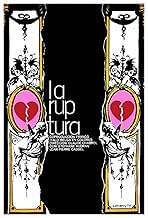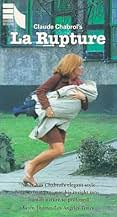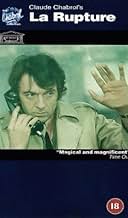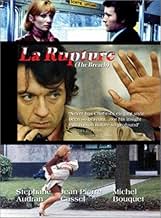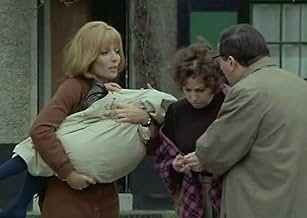IMDb-BEWERTUNG
7,2/10
2049
IHRE BEWERTUNG
Helene will sich von ihrem geistig verwirrten Mann scheiden lassen. Dessen reiche Eltern wollen das Sorgerecht für das Kind der beiden, und engagieren dafür jemanden, der Helene skrupellos i... Alles lesenHelene will sich von ihrem geistig verwirrten Mann scheiden lassen. Dessen reiche Eltern wollen das Sorgerecht für das Kind der beiden, und engagieren dafür jemanden, der Helene skrupellos in schlechtes Licht rückt.Helene will sich von ihrem geistig verwirrten Mann scheiden lassen. Dessen reiche Eltern wollen das Sorgerecht für das Kind der beiden, und engagieren dafür jemanden, der Helene skrupellos in schlechtes Licht rückt.
- Regie
- Drehbuch
- Hauptbesetzung
- Auszeichnungen
- 1 Nominierung insgesamt
Margo Lion
- Mme Humbert - la première parque
- (as Margot Lion)
Empfohlene Bewertungen
Though I've always found it difficult to stomach the parallels between Hitchcock and Chabrol (another user on this site highlighted the similarities Chabrol shares with Clouzot, a comparison that I concur with, Chabrol sharing Clouzot's moral ambiguity/overall weltschmerz), it would be foolhardy to deny the broad Hitchcockian flourishes here. Dipped and dredged in LSD, the hallucinatory sequences in here nod reverently to "Vertigo" and "Marnie". Yet, unlike some hitchcock staples (no gripes with Hitch here, he is after all my all time favorite director), there is nary a hint of escapism here. Instead, Chabrol plunges us head-first into the depths of modern complacency, a project that we are all complicit in.
The story itself is another virulently acerbic "thriller of manners" for Chabrol, capturing with Flaubertian honesty the farce upon which class distinctions are built. Other than Clouzot, I've always felt that Chabrol's work comes closest to Bunuel's (no surprise that Cassel and Audran would also feature in Discreet Charm Of The Bourgeoisie)- he brings a blowtorch to insipid, self-satisfied, hypocritical civilization, and dares to gaze into the vacuous abyss beneath. Like Bunuel and Fassbinder, he does this with consummate style and infuses his films with cruelly ironic wit.
Chabrol's films are always unnerving to watch because they come too close for comfort, and never allow us to be self-satisfied. He asks some terribly important questions: at what price are bourgeois myths of propriety, morality and civilization bought? In "The Unfaithful Wife", murder is necessary to sustain the idyll, while this movie offers a profound dissection of bourgeois identity- in order for bourgeois "decorousness" and privilege to survive, it must posit an Other, the sordid, vulgar, ill-educated boor, even if it doesn't exist. Throughout "La Rupture" the viewer witnesses the creation of these supposed "absolutes", the unfurling of the absurd narrative that legitimizes bourgeois entitlement- sully, tar and feather the peasant, the Other. Like homophobia, class prejudice is only an expression of the precariousness of identity, without an opposite to define oneself against, the suppositions invariably crumble.
Chabrol is an acutely intelligent, courageous and singularly brilliant film maker. Don't miss this deconstructive masterpiece...as an examination of class, I think only "La Ceremonie" would surpass this one.
ps i can't help but wonder if the eccentric, insular boarding-house here is an homage to balzac's maison vauqeur in his incomparable "Old Goriot"- both the altruistic doctor (Bianchot) and the moustachioed, absurdly eloquent tempter (Vautrin) are parodied/mirrored here
The story itself is another virulently acerbic "thriller of manners" for Chabrol, capturing with Flaubertian honesty the farce upon which class distinctions are built. Other than Clouzot, I've always felt that Chabrol's work comes closest to Bunuel's (no surprise that Cassel and Audran would also feature in Discreet Charm Of The Bourgeoisie)- he brings a blowtorch to insipid, self-satisfied, hypocritical civilization, and dares to gaze into the vacuous abyss beneath. Like Bunuel and Fassbinder, he does this with consummate style and infuses his films with cruelly ironic wit.
Chabrol's films are always unnerving to watch because they come too close for comfort, and never allow us to be self-satisfied. He asks some terribly important questions: at what price are bourgeois myths of propriety, morality and civilization bought? In "The Unfaithful Wife", murder is necessary to sustain the idyll, while this movie offers a profound dissection of bourgeois identity- in order for bourgeois "decorousness" and privilege to survive, it must posit an Other, the sordid, vulgar, ill-educated boor, even if it doesn't exist. Throughout "La Rupture" the viewer witnesses the creation of these supposed "absolutes", the unfurling of the absurd narrative that legitimizes bourgeois entitlement- sully, tar and feather the peasant, the Other. Like homophobia, class prejudice is only an expression of the precariousness of identity, without an opposite to define oneself against, the suppositions invariably crumble.
Chabrol is an acutely intelligent, courageous and singularly brilliant film maker. Don't miss this deconstructive masterpiece...as an examination of class, I think only "La Ceremonie" would surpass this one.
ps i can't help but wonder if the eccentric, insular boarding-house here is an homage to balzac's maison vauqeur in his incomparable "Old Goriot"- both the altruistic doctor (Bianchot) and the moustachioed, absurdly eloquent tempter (Vautrin) are parodied/mirrored here
6sol-
Intent on winning custody of their grandson who their son injured while stoned, an upper class couple set out to discredit and defame their daughter-in-law in this odd thriller from Claude Chabrol. Stéphane Audran plays the daughter-in-law, however, the majority of the film is curiously not told from her point-of-view but rather the perspective of a man hired to discredit her, played by Jean-Pierre Cassel. As such, the film does derive any juice from Audran wondering whether or not she is going insane (a la 'Gaslight'), which would not necessarily be a problem, except that Cassel's schemes are so strange and convoluted that it is obvious that they will fail before he even puts them into action. His attempts to spread gossip around the boarding house where Audran is staying are fairly credible. At his most incompetent though, Cassel tries to force Audran to eat a drugged candy (!) while his most bizarre plan involves his girlfriend wearing a wig and fondling Audran's landlady's mentally challenged daughter, expecting that the girl will mistake the wigged woman for Audran! With a perfectly terse music score and lots of fluid camera movements, 'La Rupture' still remains very watchable despite the messy plot, and the LSD-induced scenes towards the end need to be seen to be believed. There is also a lot of memorable weirdness throughout, such as Cassel's girlfriend always being nude (or partially naked) and her fondling scene, complete with an X-rated Satanic film projected in a darkened room might well rate as the very strangest sequence that Chabrol ever committed to celluloid.
The alternative English-language title of this one, THE BREAK UP, always seemed to me to imply that Chabrol had made a typically classy treatment of the theme of a family going through divorce proceedings a full decade before that Oscar-laden triumph KRAMER VS. KRAMER (1979). However, the film's very opening sequence obliterates that misconception immediately and completely: the quiet breakfast being enjoyed by a mother (the ubiquitous Stephane Audran playing, as usual, a character named Helene) and her little son is suddenly shattered by the unkempt and sinister appearance of the father (Jean-Claude Drouot – perhaps best-known for playing Yul Brynner's long-haired right-hand man in THE LIGHT AT THE EDGE OF THE WORLD the following year) who is clearly in some kind of daze brought on by the use of illegal substances.
The couple start arguing and, just as the man seems about to slap the woman, he grabs the kid and literally throws him clear across the room; the latter hits his head violently against the edge of a kitchen cupboard and lands in a bloody puddle on the floor! It is a thoroughly shocking sequence – not just because it is totally unexpected and comes so early in the film but also since this utterly vile act is committed by a father upon his own son! Previously, I had equally gasped at a similar deed featuring in Ingmar Bergman's influential period piece THE VIRGIN SPRING (1960) but, again, the blood link between abuser and abused here makes the action all the more reprehensible.
Actually, the film's original French title, LA RUPTURE, should from the outset have been more suggestive to what was in store for the perceptive viewer and, indeed, can be interpreted to allude to various characters and events: the dissolution of the couple's socially incompatible marriage; the gash in the kid's head (he is confined to a hospital bed for the duration of the film and is never again seen in a conscious state); the wrecking of the illusory brashness with which down-on-his-luck mole (Jean-Pierre Cassel, effectively cast against type) callously spins a web of deceit around Audran in a frame-up engineered by her all-powerful father-in-law (Michel Bouquet, also uncharacteristically portraying a villain) to ensure the custody of his grandson; and, at the film's conclusion, the cracking of Audran's very sanity – not only through the incredible events happening around her, but also because of her unwittingly imbibing a drug-spiked orange juice drink concocted by Cassel!!
And what about the breach in Chabrol's own stylistic approach to such archetypal material, taking in as it does a healthy dose of black comedy (the eccentric inhabitants at the foreclosing boarding house where Audran and Cassel install themselves – including three elderly tarot-playing snoops, delusional thespian Mario David, boozing landlord Jean Carmet and his bespectacled, "backward" daughter Katia Romanoff), sleazy bedroom antics (courtesy of Cassel's perennially nude and horny girl played by the delectable Catherine Rouvel) and even outright psychedelia (Audran's kaleidoscopic vision of friendly balloon vendor Dominique Zardi)! Evidently, Chabrol wears his well-documented Fritz Lang influence on his sleeve even in this case! For the record, the film under review is based on a novel by Charlotte Armstrong, of whose works Chabrol would later also adapt MERCI POUR LE CHOCOLAT (2000).
The first-rate ensemble cast also boasts a handful of other notable names: Michel Duchassoy (star of that which is arguably Chabrol's finest achievement, 1969's THIS MAN MUST DIE – appearing here as Audran's sympathetic lawyer), Angelo Infanti (as the doctor treating Audran's son and a lodger in her peculiar dwelling) and even Belgian director extraordinaire Harry Kumel (who, I am ashamed to say, I did not recognize even though I know how he looks today from recent photographs and past DVD supplements!). As always with Chabrol during this major phase in his career, the impeccable accomplishments of cinematographer Jean Rabier and composer Pierre Jansen (who contributes a strikingly unsettling score) can never be underestimated.
Incidentally, Audran and Cassel would later appear as an oversexed married couple in Luis Bunuel's THE DISCREET CHARM OF THE BOURGEOISIE (1972) and, again, in Chabrol's star-studded THE TWIST (1976) which, ironically, is reputed to be his nadir(!) – and, of course, Audran and Bouquet also played husband and wife in Chabrol's THE UNFAITHFUL WIFE (1969; which, like THE BREACH itself, can be counted among Chabrol's Top 5 movies) and JUST BEFORE NIGHTFALL (1971); besides, probably as a result of this same Franco-Italo-Belgian co-production, Bouquet and Cassel would themselves be subsequently engaged to participate in Harry Kumel's own exhilarating magnum opus, MALPERTUIS (1971).
The couple start arguing and, just as the man seems about to slap the woman, he grabs the kid and literally throws him clear across the room; the latter hits his head violently against the edge of a kitchen cupboard and lands in a bloody puddle on the floor! It is a thoroughly shocking sequence – not just because it is totally unexpected and comes so early in the film but also since this utterly vile act is committed by a father upon his own son! Previously, I had equally gasped at a similar deed featuring in Ingmar Bergman's influential period piece THE VIRGIN SPRING (1960) but, again, the blood link between abuser and abused here makes the action all the more reprehensible.
Actually, the film's original French title, LA RUPTURE, should from the outset have been more suggestive to what was in store for the perceptive viewer and, indeed, can be interpreted to allude to various characters and events: the dissolution of the couple's socially incompatible marriage; the gash in the kid's head (he is confined to a hospital bed for the duration of the film and is never again seen in a conscious state); the wrecking of the illusory brashness with which down-on-his-luck mole (Jean-Pierre Cassel, effectively cast against type) callously spins a web of deceit around Audran in a frame-up engineered by her all-powerful father-in-law (Michel Bouquet, also uncharacteristically portraying a villain) to ensure the custody of his grandson; and, at the film's conclusion, the cracking of Audran's very sanity – not only through the incredible events happening around her, but also because of her unwittingly imbibing a drug-spiked orange juice drink concocted by Cassel!!
And what about the breach in Chabrol's own stylistic approach to such archetypal material, taking in as it does a healthy dose of black comedy (the eccentric inhabitants at the foreclosing boarding house where Audran and Cassel install themselves – including three elderly tarot-playing snoops, delusional thespian Mario David, boozing landlord Jean Carmet and his bespectacled, "backward" daughter Katia Romanoff), sleazy bedroom antics (courtesy of Cassel's perennially nude and horny girl played by the delectable Catherine Rouvel) and even outright psychedelia (Audran's kaleidoscopic vision of friendly balloon vendor Dominique Zardi)! Evidently, Chabrol wears his well-documented Fritz Lang influence on his sleeve even in this case! For the record, the film under review is based on a novel by Charlotte Armstrong, of whose works Chabrol would later also adapt MERCI POUR LE CHOCOLAT (2000).
The first-rate ensemble cast also boasts a handful of other notable names: Michel Duchassoy (star of that which is arguably Chabrol's finest achievement, 1969's THIS MAN MUST DIE – appearing here as Audran's sympathetic lawyer), Angelo Infanti (as the doctor treating Audran's son and a lodger in her peculiar dwelling) and even Belgian director extraordinaire Harry Kumel (who, I am ashamed to say, I did not recognize even though I know how he looks today from recent photographs and past DVD supplements!). As always with Chabrol during this major phase in his career, the impeccable accomplishments of cinematographer Jean Rabier and composer Pierre Jansen (who contributes a strikingly unsettling score) can never be underestimated.
Incidentally, Audran and Cassel would later appear as an oversexed married couple in Luis Bunuel's THE DISCREET CHARM OF THE BOURGEOISIE (1972) and, again, in Chabrol's star-studded THE TWIST (1976) which, ironically, is reputed to be his nadir(!) – and, of course, Audran and Bouquet also played husband and wife in Chabrol's THE UNFAITHFUL WIFE (1969; which, like THE BREACH itself, can be counted among Chabrol's Top 5 movies) and JUST BEFORE NIGHTFALL (1971); besides, probably as a result of this same Franco-Italo-Belgian co-production, Bouquet and Cassel would themselves be subsequently engaged to participate in Harry Kumel's own exhilarating magnum opus, MALPERTUIS (1971).
LA RUPTURE is one of Claude Chabrol's most devastating critiques of the bourgeoisie and it's one of his finest films. It's about a working wife and mother fighting for custody of her small son after the boy's drug-addicted father has attacked them, only to find her husband's rich parents have hired a sleazy, corrupt investigator to destroy her reputation. The film isn't flawless; there are too many extraneous and eccentric characters but the main plot is beautifully handled, (it's based on a novel by Charlotte Armstrong), and Stephane Audran as the wife and Jean-Pierre Cassel as the investigator are both terrific. Of course, you may think Chabrol's decision to treat such a serious subject as domestic violence purely as a thriller a little tasteless but fundamentally this isn't really a film about domestic violence at all but an almost Dickensian study of evil; the bourgeoisie parents are distinctly rotten, the investigator even more so. If the film were more 'realistic' it might be unbearable; there's a scene of potential child sex abuse, and the child is mentally handicapped, that is almost too bizarre to be really disturbing and the film gets very bizarre towards the end. However, even with its convoluted plot it works superbly both as an outright thriller and as a scathing indictment of a highly amoral society.
Like Graham Greene's so-called entertainments, this film veers into melodrama, but it never seemed unreal to me and was certainly a pleasure to watch. The highlight for me was the machinations of the lowlife hired to bring the heroine down. I also got drawn into the setting of the rooming house and the warmth of the more innocent people that give strength to the heroine. Acting, as always in a Chabrol film, is superb.
Wusstest du schon
- WissenswertesClaude Chabrol once stated that the bus scene where Hélène (his wife Stéphane Audran) tells her family's story to the lawyer (Michel Duchaussoy) was the occasion when he finally thought that Stéphane had become an actress.
- Zitate
Opening Title Card: [from the French] But what thick night suddenly surrounds me? JEAN RACINE
- VerbindungenReferences Die Unbesiegten (1969)
Top-Auswahl
Melde dich zum Bewerten an und greife auf die Watchlist für personalisierte Empfehlungen zu.
- How long is The Breach?Powered by Alexa
Details
- Laufzeit2 Stunden 4 Minuten
- Sound-Mix
- Seitenverhältnis
- 1.85 : 1
Zu dieser Seite beitragen
Bearbeitung vorschlagen oder fehlenden Inhalt hinzufügen


